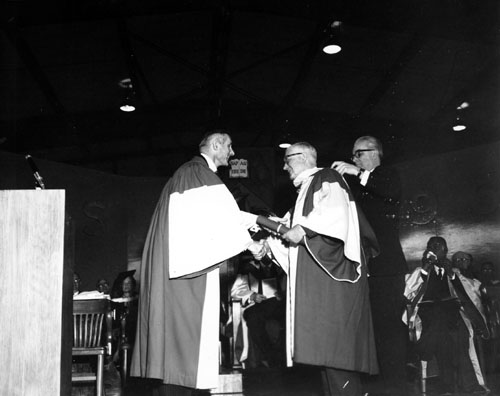1965 Fredericton Encaenia
Thomson, Roy Herbert
Doctor of Civil Law (D.C.L.)
Orator: Cattley, Robert E.D.
Image Caption
L to R: Colin B. Mackay, Roy Herbert Thomson, C.L. Mahan
Second Image Caption
Source: UA PC-4 no.12(51); Photo by Harvey Studios
Citation:
ENCAENIA, MAY, 1965
ROY HERBERT THOMSON
to be Doctor of Civil Law
Canadian boy; poor parents, started from nothing; set up on credit, made money; invaded England, made more money; Stormed Fleet Street, very much money; raided Scotland, some money; multimillionaire, still making money; crashed Society, awarded a Peerage; Chancellor of Canadian University . . . the pattern is somewhat familiar!
Familiar, too, is the sane rationale that making money is a newspaper's first object. That object attained -- and it is
attainable very simply by attracting more readers than its rivals -- the disposal of the money is what reveals the soul of its maker. It is true that to Lord Beaverbrook money meant power, in his earlier years political power; whereas to the Baron of Fleet and Northbridge money seems to mean power to buy up more and more newspapers. But with these, their secondary objects, attained, both men were inspired by a single vision and dedicated vast resources to the greatest power in the world to-day, Education.
Lord Thomson is perhaps more famous for his brilliant strategy with the London Sunday Times. And that is why I propose to quote the following generous editorial from its rival, the Observer, of November 1962:
"Mr. Roy Thomson is to be congratulated on creating a foundation to train journalists and television personnel from the developing countries. It is consistent with his policy of entering these countries as a newspaper proprietor and television operator. One of the happiest things for a new nation is to produce a non-governmental newspaper and reasonably independent television service. No one except a courageous publishing entrepreneur, like Mr. Thomson, could supply the Afro-Asian states with these essentials of democracy. His many activities in these fields genuinely entitle him, we think, to a peerage.
And, Mr. President, may I add "to an honorary degree".
From:
Cattley, Robert E.D. Honoris causa: the effervescences of a university orator. Fredericton: UNB Associated Alumnae, 1968.
ROY HERBERT THOMSON
to be Doctor of Civil Law
Canadian boy; poor parents, started from nothing; set up on credit, made money; invaded England, made more money; Stormed Fleet Street, very much money; raided Scotland, some money; multimillionaire, still making money; crashed Society, awarded a Peerage; Chancellor of Canadian University . . . the pattern is somewhat familiar!
Familiar, too, is the sane rationale that making money is a newspaper's first object. That object attained -- and it is
attainable very simply by attracting more readers than its rivals -- the disposal of the money is what reveals the soul of its maker. It is true that to Lord Beaverbrook money meant power, in his earlier years political power; whereas to the Baron of Fleet and Northbridge money seems to mean power to buy up more and more newspapers. But with these, their secondary objects, attained, both men were inspired by a single vision and dedicated vast resources to the greatest power in the world to-day, Education.
Lord Thomson is perhaps more famous for his brilliant strategy with the London Sunday Times. And that is why I propose to quote the following generous editorial from its rival, the Observer, of November 1962:
"Mr. Roy Thomson is to be congratulated on creating a foundation to train journalists and television personnel from the developing countries. It is consistent with his policy of entering these countries as a newspaper proprietor and television operator. One of the happiest things for a new nation is to produce a non-governmental newspaper and reasonably independent television service. No one except a courageous publishing entrepreneur, like Mr. Thomson, could supply the Afro-Asian states with these essentials of democracy. His many activities in these fields genuinely entitle him, we think, to a peerage.
And, Mr. President, may I add "to an honorary degree".
From:
Cattley, Robert E.D. Honoris causa: the effervescences of a university orator. Fredericton: UNB Associated Alumnae, 1968.
Citations may be reproduced for research purposes only. Publication in whole or in part requires written permission from the author.
